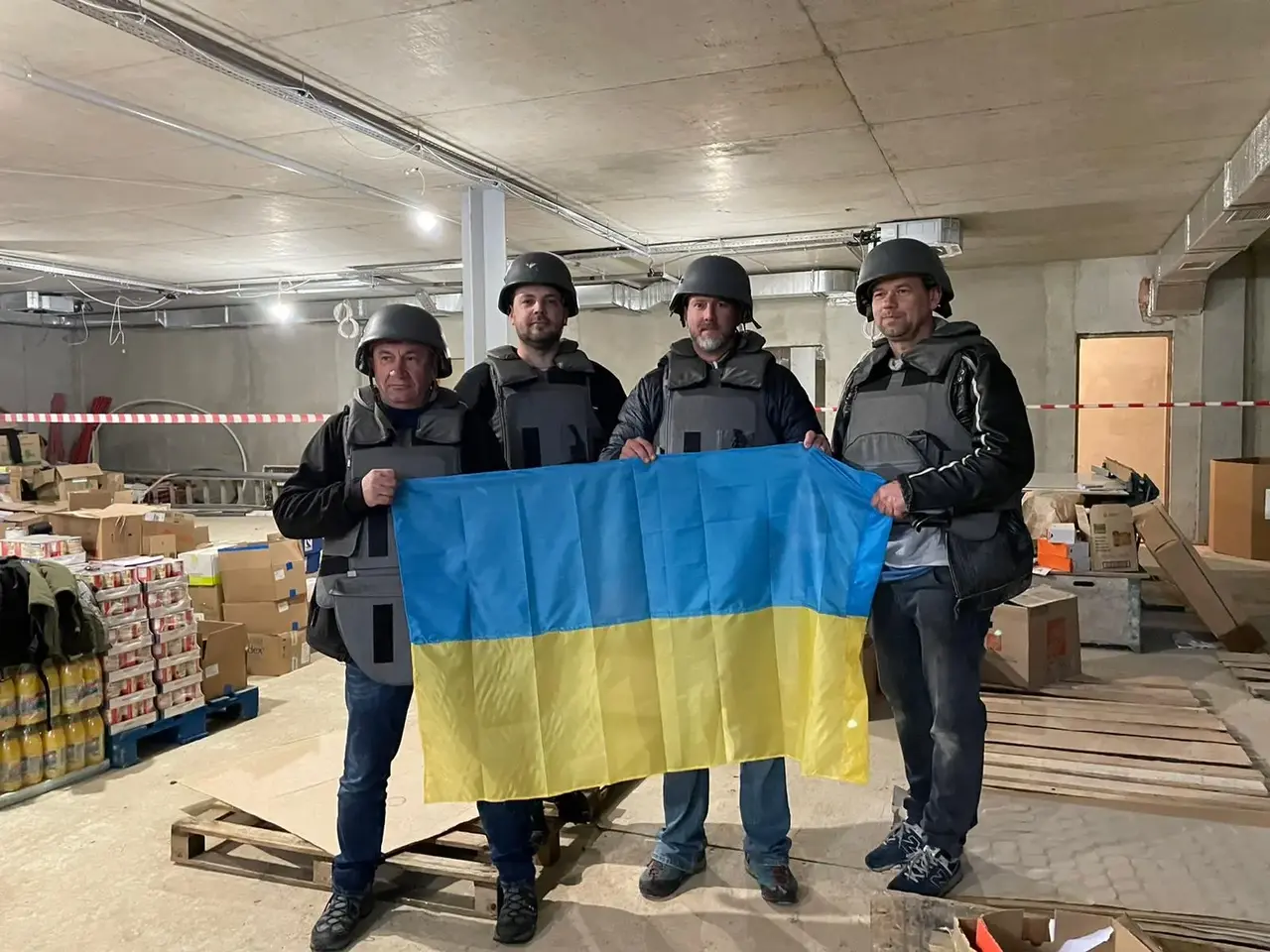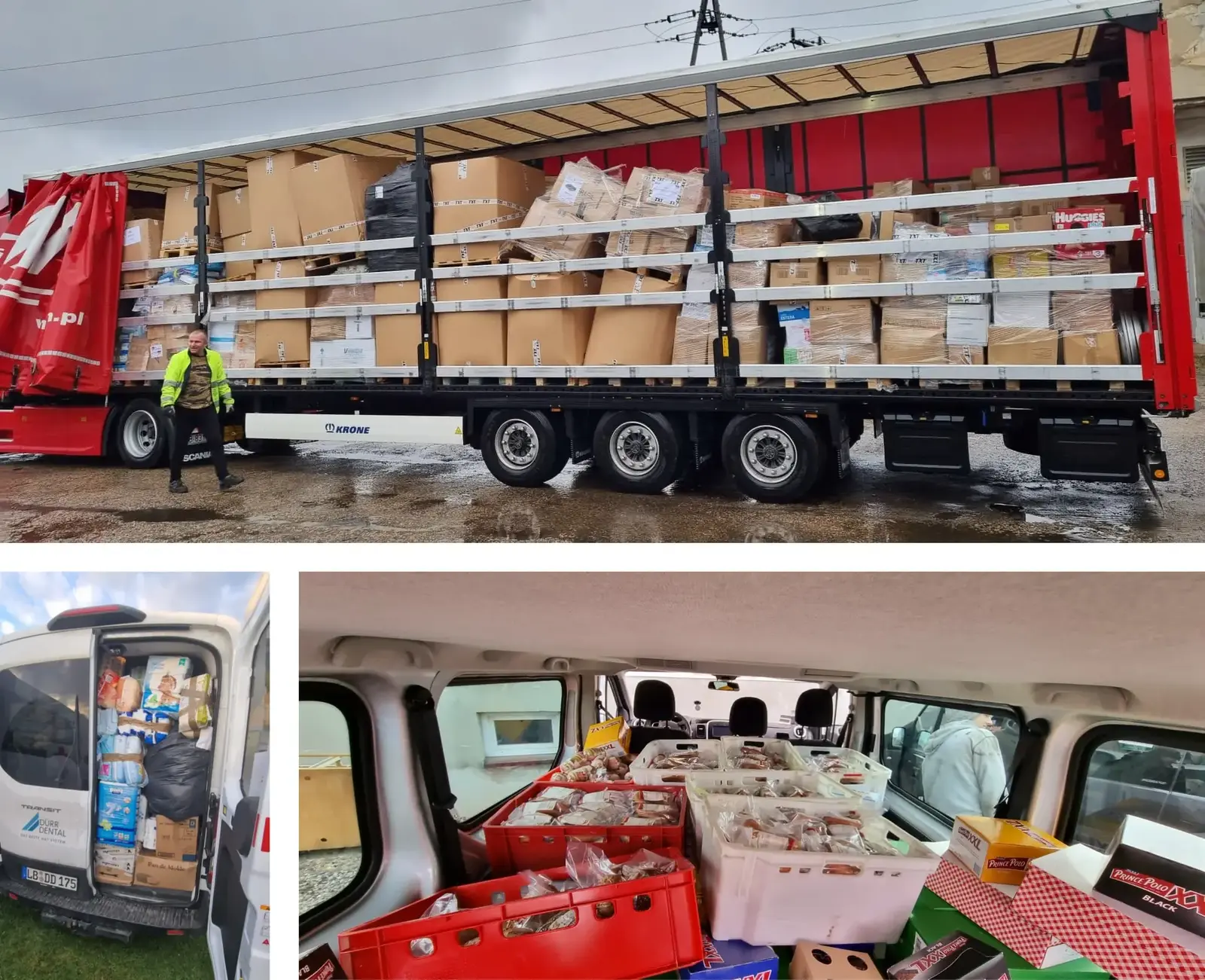Honoring Sunflower Yellow and Sky Blue

A yellow and blue dome is our emblem of support for Ukraine. May the volunteers be blessed with safety and success. May the people afflicted by war find solace and peace. And may the war end, soon, and Ukraine blossom like a sunflower.
The colors of the Ukrainian flag—sunflower yellow and sky blue—are everywhere. The colors grace magazines, landmarks, clothing, flowers, and even cosmonauts. We are adding our own emblem of support with a Monolithic Dome twist—and a plea.
The Monolithic Dome Institute is an apolitical organization that doesn’t endorse political platforms or candidates. We do encourage improved regulations for energy-efficient, safe, green construction. We rarely comment on world events.
When the Russia–Ukraine war started we wanted to express support for Ukraine but felt it would be best if this support was subtle. I picked a blue and yellow image of Pappy’s Storehouse that I helped Gary Clark paint in 1983. I was 15-years-old and it was the first time I’d worked with Gary who would eventually become my brother-in-law and business partner. It was a pretty good blog post. I may add it later.
But the war crimes in Bucha canceled that post. Subtle, indirect support is not enough.
“For those of us born after World War II, this is the most consequential war of our lifetime,” writes Eliot A. Cohen for The Atlantic. “If Ukraine succeeds in preserving its freedom and territorial integrity, a diminished Russia will be contained; if it fails, the chances of war between NATO and Russia go up, as does the prospect of Russian intervention in other areas on its western and southern peripheries.
"Russia’s sheer brutality and utterly unwarranted aggression, compounded by lies at once sinister and ludicrous, have endangered what remains of the global order and the norms of interstate conduct.”
It’s war. It’s scary. No one can predict what will happen.
But we should not despair. The late Fred Rogers of Mr. Rogers Neighborhood would say, “When I was a boy and I would see scary things in the news, my mother would say to me, ‘Look for the helpers. You will always find people who are helping.’”

Volunteers wear body armor when they work inside the border of Ukraine to deliver humanitarian supplies.
The helpers are everywhere. Millions of refugees are finding solace in the arms of strangers.
We have acquaintances living in Moldova. Their three-bedroom apartment is filled with seven families from Ukraine. All women and children because they had to leave their husbands and adult sons behind. “We are packed wall-to-wall, but we make it work.”
Our friends—and the millions who care for refugee families—will never have their names written in the history books. They will be a statistic about how many refugees were helped.
For the refugee families they took in, their names will be remembered for generations.

Tons of food, clothing, medicine, and hygiene products are delivered directly into Ukraine. Volunteers used trucks, vans and their own cars to get these supplies to those who need them most.
We have colleagues living in Poland. They’ve built Monolithic Dome structures all over Europe, including Ukraine and Russia. When the war broke out they, their church congregation, and many others organized tons of food, clothing, and other humanitarian aid. Every weekend they travel to and into Ukraine to hand out their love and friendship.
They wear body armor and are witnessing, firsthand, the brutality of this war. The broken lives. We won’t share their heartbreaking stories because they asked us not to.
They do not seek glory or commercial gain from their efforts. They only wish to help. But we cannot ignore their efforts. If there is good to come from this terrible war, it’s going to be from people helping each other. They inspire us. They make us want to do more.
So here we are, with a plea.
Help. Please.
Donate money to reputable charities. Organize and donate to humanitarian shipments. Everything helps. Many small donations turn into great shipments of hope for those who are suffering.
Donate directly
We asked our Polish friends where they recommend donating money. They replied, “There are many charities that say they help in Ukraine and they probably do, but with this one [below] I am 100 percent positive all donations go to the cause. They operate only with volunteers and use their private cars. All donations go to food and supplies which are given to people directly in Ukraine—to places almost no one dares to go.”
He asks, “I am kindly asking you to consider helping this cause.”
Visit Kosciol Wolnych Chrzescijan for more information (Google Translate version). To donate, go to their homepage and scroll down to the bank accounts information. Look for the box for “USD” donations.
Connect to reputable charities
GlobalGiving.org is a platform that connects local organizations with donors from around the world. GlobalGiving has a 4-star rating on Guidestar.org, which means they are an organization you can trust.
What I like about this group is that they are actually a platform for locally-led organizations around the world. So instead of spending money in the US on expensive overhead and people to “export” to a disaster, they find local groups already on the ground who stand ready to assist in any number of ways.